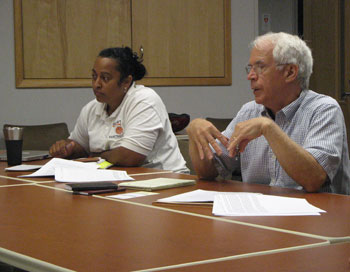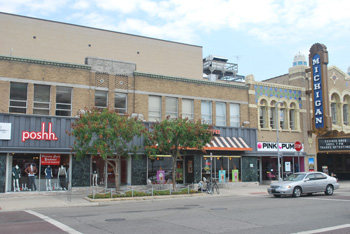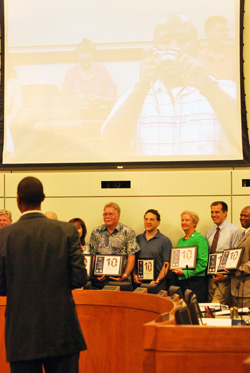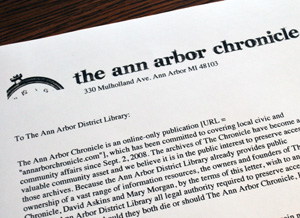John & Debbie Dingell give rally-the-troops speeches at the Ann Arbor Dems annual Labor Day picnic. Debbie Dingell uses the Yousef Rabhi/Mike Fried Democratic primary for county commissoner to make the point that every vote counts. (Rabhi won by two votes.) The Elks barbeque smells great. [photo] [photo]
Archive for September, 2010
Superintendent Search Step One: Hire Help
Representatives from two executive search consultants met with two members of the Ann Arbor Public Schools Board of Education on Friday to discuss the request for proposals (RFP) recently issued by the district. In the last week of August, the district issued the RFP, which solicits proposals to help with the board’s search for a new superintendent, after Todd Roberts resigned in mid-August.

AAPS board members Susan Baskett and Glenn Nelson met with representatives of two search consultants who will be bidding for the contract to help AAPS with its superintendent search. (Photos by the writer.)
The two consultants that attended were the Michigan Association of School Boards (MASB), from Lansing, and David J. Kinsella and Associates, from Ann Arbor. By the end of the meeting, both consultants said their questions had been answered, and that they planned to submit proposals.
As the board embarks on the replacement process for Roberts – the district’s current superintendent who will be leaving in November – it has decided to hire an executive search firm to help in the recruitment, selection, and hiring process. Friday’s meeting was optional, and offered potential bidders a chance to ask questions of board members Glenn Nelson and Susan Baskett before bids are due on Friday, Sept. 10 at 10 a.m. [Full Story]
UM: Football
On the Bleacher Report, Dave Thurman shares some thoughts about reactions to Michigan’s season-opening win on Saturday: “The media is nothing if not predictable. Desperate for a story they will create one if necessary. Exhibit A is their giddiness in regard to Michigan, treating the boys from Ann Arbor as if they are the comeback story of the decade. From looking at the front pages of pretty much every college football site on the internet, one would deduce that the Wolverines are back as a football power. And, Denard Robinson is certainly the new media darling, with some pundits ready to throw his name into the Heisman race. But as analyst Lee Corso would say (and … [Full Story]
A2: Business
Several media outlets report that Business Leaders for Michigan has raised $50 million for its Renaissance Venture Capital Fund. The Renaissance Fund, led by Chris Rizik of Ann Arbor, invests in other venture capital funds that then intend to invest in Michigan businesses. To this point, the fund has invested in Ann Arbor’s Arboretum Ventures and RPM Ventures and four other venture capital funds, according to a report in the Detroit Free Press. Among the Michigan companies benefiting from the funds are Ann Arbor’s Accuri Cytometers, Histosonics, and Swift Biosciences. [Source]
More Solar Energy Projects In the Works
Bonnie Bona insists that the best way to make pesto is with a mortar and pestle. While she admits the method is more labor-intensive than using a food processor, Bona cites it as yet another tip to become more eco-friendly.

The plain brick wall on the Michigan Theater Building on East Liberty in downtown Ann Arbor – rising up behind the storefronts – will be the site of a solar panel installation funded by XSeed Energy, a program of the Clean Energy Coalition and the city of Ann Arbor. (Photos by Mary Morgan.)
As a project manager for the Ypsilanti-based Clean Energy Coalition, Bona specializes in this art of saving energy. She is quick to add, however, that “my goal isn’t to make people sacrifice and suffer. It’s to make them see opportunities where life can be better and, oh, by the way, it uses a lot less energy.”
But it’s not just about using less energy. Bona and others in the Ann Arbor area are involved with projects that focus on generating alternative energy, too – in particular, solar power. Prompted in part by the lure of tax credits and available state and federal funding, an increasing number of efforts are underway to install solar panels on individual residences, businesses, nonprofits and schools – including, as one recent example, the Rudolf Steiner School of Ann Arbor.
And in mid-August, the Ann Arbor Historic District Commission unanimously approved two solar installation projects in historic districts, one for a private home on South Seventh Street, and another at the Michigan Theater. With some citing concern over aesthetics, commissioners acknowledged that they’ll likely see more of these requests in the future, and discussed the need to develop guidelines for solar installations within the city’s historic districts. [Full Story]
UM: Filmmaking
The Detroit Free Press reports on the Michigan Creative Film Alliance, a venture of UM, Michigan State, and Wayne State University. The students’ work, a 30-minute movie titled “Appleville,” is still in post-production, though UM professor Jim Burnstein feels the program’s intention – to get film students to stay in Michigan – has already been fulfilled. The article quotes MSU alumnus and former chief of 20th Century Fox Bill Mechanic: “I get calls and letters from Michigan kids who want to come out and talk. I’m right now telling them you’ve got a better shot getting into a picture in Michigan than you do a picture in Hollywood.” [Source]
A2: Book Fest
The Detroit Free Press previews the upcoming Kerrytown BookFest, held this year on Sept. 12. Beginning as an event to showcase the art of bookmaking, this year the line-up of exhibitors and events focuses on Michigan authors. “This year every author is either from Michigan or writes about Michigan – it’s totally Michigan-centric,” says BookFest program chair Robin Agnew. “These are pretty wonderful writers and, we think, a terrific way to focus on what’s great about Michigan.” [Source]
Land Bank Revived, Millages Reviewed
Washtenaw County Board of Commissioners meeting (Sept. 1, 2010): During a meeting that lasted less than 90 minutes – including a break for a photo op – commissioners covered a lot of ground at their first meeting following a scaled-back summer schedule.

Washtenaw County commissioners get their photo taken, with plaques given to them by the U.S. Census Bureau. In the foreground, with his back to the camera, is Toine Murphy, a partnership specialist from the U.S. Census Bureau’s Detroit office, who presented the plaques to commissioners. Bonus points to readers who can identify the woman on screen in the background, and what she's doing. (Photos by the writer)
Two millage-related issues were dispatched without discussion: making minor changes to ballot language for renewing the natural areas preservation program millage, and setting a Sept. 15 public hearing for renewal of an indigent veterans relief millage.
Commissioners gave initial approval, again without discussion, to transfer the use of $10 million in federal Recovery Zone Economic Development Bonds from the county to the Washtenaw Community College. WCC plans to use the bonds to fund construction of a parking structure.
Also getting initial approval was a resolution to authorize the county to issue dog license renewals year-round, and to add the option of a three-year license. Currently, one-year dog licenses can be bought starting Dec. 1 for the upcoming year.
An agreement with St. Joseph Mercy Health System was terminated, related to the operation of the Delonis Center – the county’s homeless shelter. The agreement, put in place when the shelter was conceived, called for St. Joe’s to step in and operate the center if the entity created to do that work – the Washtenaw Housing Alliance – couldn’t perform that task. The WHA subsequently subcontracted operations to the Shelter Association of Washtenaw County and Food Gatherers, which have been operating the shelter for eight years. St. Joe’s asked that they be released from the agreement, but will keep their representatives on the WHA board.
And after months of discussion and debate, the board approved two resolutions that revived the county’s land bank, which commissioners had voted to dissolve in March 2010. Leah Gunn dissented, and three commissioners – Ken Schwartz, Jessica Ping and Barbara Bergman – were absent. County treasurer Catherine McClary, Ypsilanti mayor Paul Schreiber and Sabra Briere, an Ann Arbor city councilmember, attended the meeting to support the land bank, a tool used to help the county deal with foreclosed and blighted properties, and after the vote they all thanked the board for its action. [Full Story]
DDA Retreat Date Set
The date and time for the Ann Arbor Downtown Development Authority’s board retreat, discussed at its last board meeting, has been set: Wed., Sept. 22, from 9 a.m. to noon in the DDA board room, located at 150 S. Fifth Ave., Suite 301. The purpose of the retreat will be to discuss the status of negotiations between the DDA and the city on the agreement under which the DDA manages the city’s parking system.
Sunday Funnies: Bezonki
Tappan & Hill
Red Solo cups are blowing down Hill Street. Community Standards staff are out in force.
UM: Health
AOL Health reports on a UM study that showed students who eat vending machine food have a higher risk of obesity and chronic problems like diabetes and coronary heart disease. Lead author and clinical lecturer at UM Medical School Madhuri Kakarala says, “The foods that children are exposed to early on in life influence the pattern for their eating habits as adults.” While vending machines do provide essential revenue to struggling schools, Kakarala says, “If we were able to substitute some healthy choices, then the schools could still get some revenue but have a more healthful environment.” [Source]
UM: Clean Energy
Crain’s Detroit Business reports that the U.S.-China Clean Energy Research Center has granted $12.5 million to a consortium led by UM. The consortium, called the Clean Energy Research Center on Clean Vehicles, will focus on the development of electric vehicles. “This unprecedented public-private partnership across international boundaries is a model for how to tackle the grand energy challenges we are facing on a global scale,” says Dennis Assanis, director of the Michigan Memorial Phoenix Energy Institute and principal investigator of the project. [Source]
Column: Arbor Vinous
Imagine a restaurant that thrives and grows based on its friendly service, consistent products, strong marketing and support for and from its community.
But peek in the kitchen and you discover packaged mixes, pre-sliced produce, shortcut recipes and commercially-prepared dishes, straight from a central commissary or food-service supplier.
Its primarily pre-packed ingredients never spoil, but neither do they ever taste truly fresh. Menu items don’t vary from one visit to the next, thanks to consistent sourcing and preparation – but neither do they ever excite, or rise above the overall uniformity and mediocrity of their processed flavors.
Now imagine that this restaurant is, instead, a winery. And let’s consider the curious case of downtown Saline’s Spotted Dog, which just announced a capacity-tripling expansion accompanied by positive nods from some local media.
The affable John Olsen, a refugee from the world of corporate tech support, looks up from behind the tasting counter as you enter the Spotted Dog, a brick-walled, 1,600-square-foot storefront just off the corner of Michigan Avenue and Ann Arbor Street.
Olsen, who co-owns the winery with his wife, Jill, is tediously affixing labels to a batch of newly-filled bottles. Such is life at a micro-winery, where hand labor often stands in for expensive and space-consuming machines. [Full Story]
Westgate Shopping Center
Skywriter doing his/her thing. [photo]
UM: Michigan Stadium
Writing in the New York Times, former Ann Arbor News columnist Jim Carty reports on the financial status of the renovations and expansion of Michigan Stadium. The article quotes Andrew Zimbalist, an economics professor at Smith College who has written about the commercialization of college sports: “There were a number of choices and they went for the most aggressive choice. It’s likely to pay off because of the strength of the brand. It’s not likely to pay off as handsomely as they hoped and projected, but that’s not unusual.” [Source]
UM: Lasers
Scientific American reports on an innovative laser intended for warzone helicopters to prevent their detection by anti-aircraft weapons. Mohammed Islam, a laser and fiber-optics scientist at UM, and his colleagues are developing the technology. While lasers often emit only one type of wavelength, this laser radiates a much broader range of wavelengths, which is a key factor in its successful deflection of missiles. Islam estimates that laser prototypes will cost $100,000, compared to laser-based aircraft systems that run from roughly $1 million. [Source]
UM: Concrete
A CBS News report on the condition of America’s infrastructure includes an interview with Victor Li, a UM professor who’s developing a kind of flexible concrete: “Li’s concrete is not only flexible, but it also heals itself. Any cracks that form will expose millions of tiny microfibers that form a seal when exposed to air and water. The cracks fill themselves in before they compromise safety. Dr. Li said that a bridge made of self-healing concrete would have an average life-span of 100 years. The problem is self healing concrete will probably cost 3 times as much as the regular stuff.” [Source]
Grafitti Alley
The unmistakeable sound of spray paint cans being shook in Grafitti Alley.
DDA Board Retreat to Focus on City Talks
Ann Arbor Downtown Development Authority board meeting (Sept. 1, 2010): On its surface, the first regular meeting of the DDA board after its July election of new officers seemed to be a relatively uneventful gathering. Two topics that could have prompted extended deliberations were handled in short order.

Washington & Fifth Avenue, looking northwest. The concrete mixer is parked directly in front of the DDA offices. The entry for the board's Sept. 1 meeting was through the alley and the garage, which makes up part of the ground floor of the Fifth Avenue Building. (Photos by the writer.)
The first issue, handled with relatively little comment, was the report out from the DDA’s “mutually beneficial” committee, given by Roger Hewitt. The committee has been meeting over the course of the summer with a corresponding committee from the Ann Arbor city council to renegotiate the parking agreement under which the DDA manages the city’s parking system.
While board members Newcombe Clark and Russ Collins commented in a general way on the status of the conversations, it did not lead to any specific directive to the DDA’s committee for its next meeting, which will take place on Sept. 13 at 8:30 a.m.
However, at the suggestion of DDA executive director Susan Pollay, the board will schedule a retreat between now and its monthly board meeting in October – but likely after Sept. 13 – to focus on the “mutually beneficial” issue. In the meantime, the DDA’s committee will request of its city council counterparts that they provide their own assessment of the status of the negotiations. The Sept. 13 meeting of the two committees will also be the occasion when Pollay provides a detailed version of the outline, which she’d provided at the last committee meeting on Aug. 23, for a possible role for the DDA in the development of city-owned surface lots.
The second issue dispatched by the board with little overt controversy was a resolution that Newcombe Clark had brought through the operations committee last Wednesday to allocate $50,000 for support of skatepark facilities. Clark himself suggested that the resolution be tabled, alluding to the “prism through which everything is looked at this time of year.” DDA board members went along with that suggestion.
The prism to which Clark alluded is a political one. Clark is running an independent campaign for the Ward 5 city council seat currently held by Democrat Carsten Hohnke. Hohnke has positioned himself as a champion of the skating community’s efforts to construct a skateboarding facility at Veterans Memorial Park, which is in Ward 5.
At Wednesday’s meeting, the newest member of the board, former Washtenaw County administrator Bob Guenzel, and the member he replaced, Jennifer S. Hall, were acknowledged by chair Joan Lowenstein – but neither was present. The board passed a resolution of appreciation for Hall’s service, and Lowenstein welcomed Guenzel “in absentia.”
Other business at Wednesday’s meeting included the usual updates from the board’s committees. Notable from the transportation committee was an effort to collaborate with the Ann Arbor Transportation Authority to enhance bus service between Ann Arbor and Ypsilanti. And from the partnerships committee came a summary of a presentation they’d received from the chief of police – there’s a difference between being statistically safe and the perception of safety. [Full Story]
Column: The Rivalry
Ten years ago, ESPN viewers voted the Michigan-Ohio State football game the best rivalry in the nation. Not just in college football, or football in general, but in all sports. Since 1935, it’s held a privileged spot as the last game of the Big Ten season. More college football fans have seen this rivalry, in person and on TV, than any other.
HBO has produced dozens of sports documentaries, but only one on college football: the Michigan-Ohio State game. They titled it simply, “The Rivalry.” They did not feel they had to explain it.
But when the Big Ten added Nebraska, everything seemed up in the air, including the Michigan-Ohio State game. Next fall the Big Ten will have 12 teams, playing in two divisions, culminating in a title game – all new.
So that raised a few possibilities – not to mention plenty of rumors and fears. [Full Story]
State & Liberty
Southbound University of Michigan blue bus flashing “Hail to / the victors” in place of a route name.
State Street
Hordes of students walking down State Street to the New Student Convocation at Crisler Arena.
EMU: Medical Marijuana
The Eastern Echo reports on the status of medical marijuana at EMU’s campus. Greg O’Dell, Eastern’s police chief, says that marijuana is banned entirely on campus, even for medicinal purposes. But off-campus, marijuana can be purchased and used legally, as long as the consumer has a medical marijuana card. The article quotes Matt Lafleur, who’s applying for a medical marijuana card: “You can find people who will hand out medical marijuana cards like candy. As long as you have $250.” The article notes that Michigan’s medical marijuana website offers additional information. [Source]
Column: Two-Year Milestone
Editor’s Note: The monthly milestone column, which appears on the second day of each month – the anniversary of The Ann Arbor Chronicle’s launch – is an opportunity for either the publisher or the editor of The Chronicle to touch base with readers on topics related to this publication.
Last month I trekked over to the Ann Arbor District Library to hand-deliver a paper document to the library’s director, Josie Parker. It was a letter that stated our intent, as owners of The Ann Arbor Chronicle, to grant all necessary legal authority to the AADL to preserve public access to our publication’s archives, in the event that The Chronicle closes or that we get hit by a bus.
It was an important decision for us, and one we didn’t take lightly – “we” being me and my husband Dave Askins, who’s editor and co-owner of The Chronicle. For me, The Chronicle has always been a convergence of the professional and the personal. Launching the publication on Sept. 2, which is also our wedding anniversary, reflects that connection. So choosing how to ensure the preservation of The Chronicle’s archives was more than a business decision.
The corpus of civic affairs and local government reporting that we’ve compiled in The Chronicle’s first two years, we believe, is a community asset worth preserving. During my tenure at The Ann Arbor News, I was always appalled at the condition of the archives there, neglected and deteriorating in a basement space we called The Cage. I was thrilled when the AADL negotiated to become caretaker of that massive collection, some items dating back to the late 1800s. Given the AADL staff’s obvious competence and eagerness to dig into the project – organizing more than 1 million items – it seemed a natural fit to ask that they consider shepherding our much less space-demanding slice of local journalism, too.
The Chronicle, of course, was born digital, and at this point would fit on a thumb drive. Although we’d likely be classified by most folks as “new media,” in many ways we embrace an ethos that runs contrary to current trends. And that’s why I liked the idea of walking a few blocks to the library and handing over a letter – a physical artifact that outlines the hopes of a digital future. And on this occasion of The Chronicle’s second anniversary, I’d like to chew on that notion a little more, and talk about what its implications might be. [Full Story]
County Board Approves Revised Dog License
At its Sept. 1, 2010 meeting, the Washtenaw County board of commissioners gave initial approval to year-round dog license renewals, with the added option of a three-year dog license. Currently, a one-year dog license is available for purchase starting Dec. 1 for the upcoming year. Dog owners have until March 1 to buy a one-year license before their previous license expires. The board also approved a new fee schedule: Licenses will cost $1 a month for a maximum of 3 years for spayed or neutered dogs, or $2 a month for unaltered dogs. A final vote on the changes is expected at the board’s Sept. 15 meeting.
This report, filed just after the board meeting adjourned, will be followed by a … [Full Story]
County Land Bank Moves Forward
The Washtenaw County board of commissioners took action at their Sept. 1, 2010 meeting to resurrect a land bank that they had dissolved earlier this year. They had tabled two resolutions at their August meeting – revising an intergovernmental agreement and rescinding a previous resolution that had dissolved the land bank. Both resolutions passed on Wednesday, with dissent from commissioner Leah Gunn. Ypsilanti mayor Paul Schreiber and Sabra Briere, an Ann Arbor city councilmember, both attended the meeting to speak in support of the land bank, a tool used to help the county deal with foreclosed and blighted properties.
This report, filed from the board meeting, will be followed by a detailed article. [link]
Hearing Set for Veterans Relief Millage
At its Sept. 1, 2010 meeting, the Washtenaw County board of commissioners set a Sept. 15 public hearing to get input on the indigent veterans’ relief millage. The board also gave initial approval to levy the 1/40 mill, which does not require voter approval and would raise an estimated $362,415 for services to local veterans. It was first passed two years ago, and cost homeowners $2.50 for every $100,000 of a home’s taxable value.
This report, filed from the board meeting, will be followed by a detailed article. [link]
Language Revised for Natural Areas Millage
At their Sept. 1, 2010 meeting, the Washtenaw County board of commissioners approved minor revisions to ballot language for a millage renewal to fund the county’s natural areas preservation program. At its Aug. 4 meeting, the board approved putting the NAPP millage on the Nov. 2, 2010 ballot. The 10-year millage was first approved by voters in 2000, and will have generated about $27.5 million by the time it expires. The 0.2409 mill tax is expected to raise roughly $3.5 million in annual revenues if approved by voters.
This report, filed live from the county board meeting, will be followed by a detailed article. [link]
Shelter Agreement with St. Joe’s Altered
At its Sept. 1, 2010 meeting, the Washtenaw County board of commissioners voted to terminate a joint operating agreement with St. Joseph Mercy Health System for the Delonis Center, the county’s homeless shelter. The agreement had been signed at the shelter’s inception, when St. Joe’s agreed to step in and operate the center if the entity created to do that work – the Washtenaw Housing Alliance – couldn’t perform that task. The WHA subsequently subcontracted operations to the Shelter Association of Washtenaw County and Food Gatherers, which have been operating the shelter for eight years.
This report, filed from the board meeting, will be followed by a detailed article. [link]







